The global online gambling market is expected to exceed $138 billion in 2028, and predictive analytics is fueling this explosive growth by using massive amounts of data to anticipate player behavior and tailor the experience. This technology allows casinos to read players’ minds, offer personalized promotions, and enhance the gaming experience while ensuring fairness, integrity, and a safer, more responsible environment for everyone.
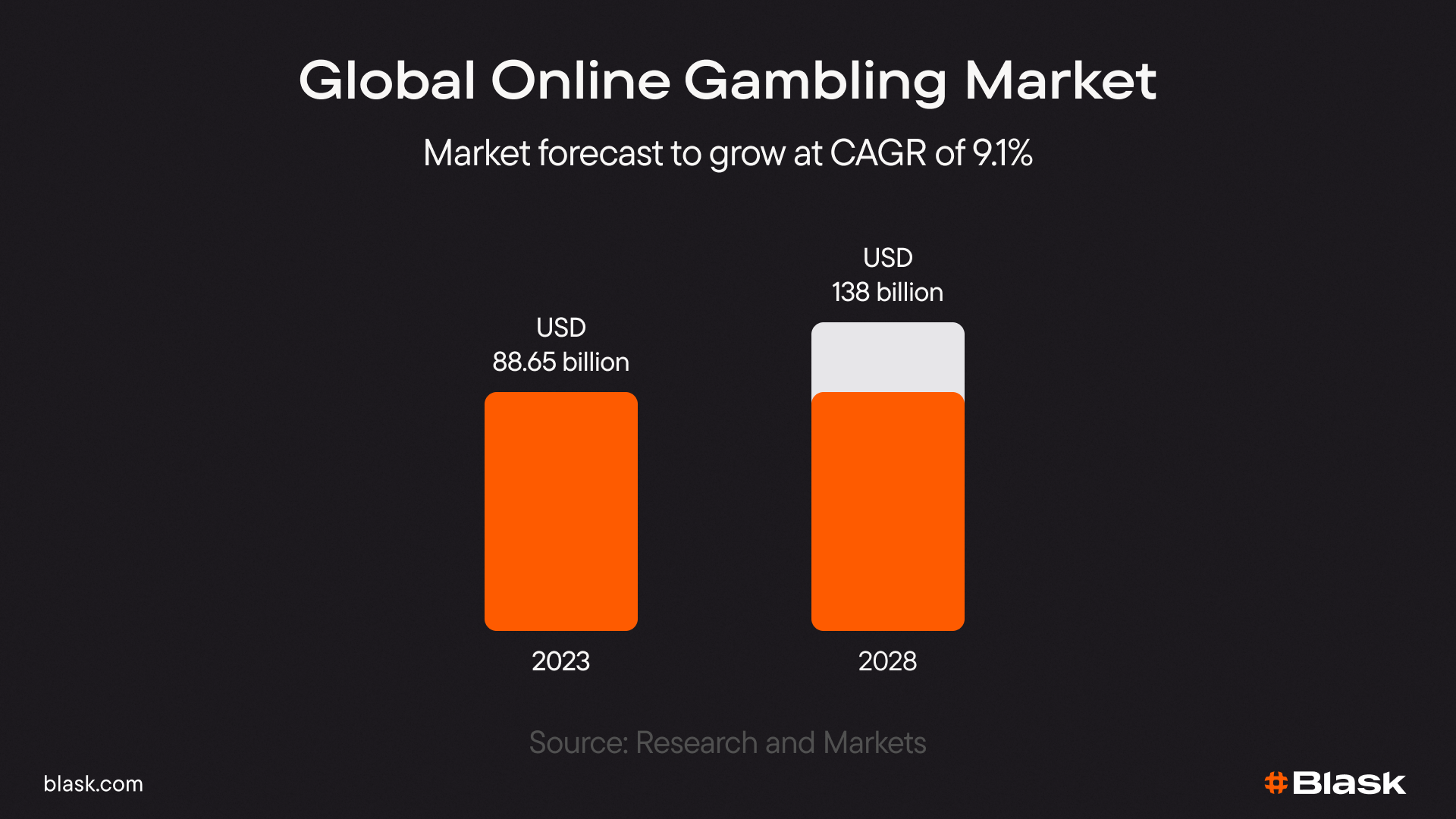
The role of predictive analytics in online gambling.
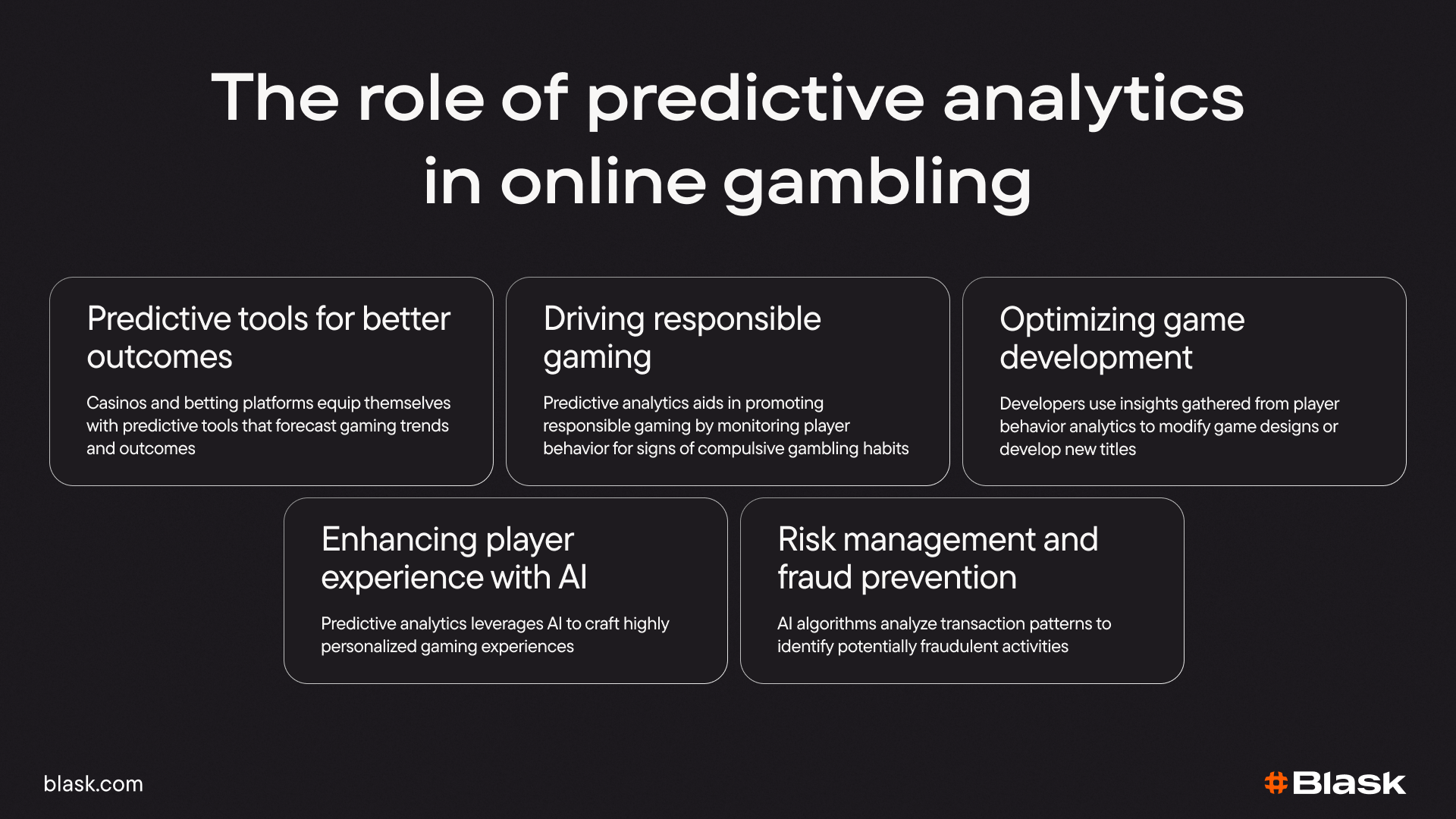
Enhancing player experience with AI.
Predictive analytics leverages AI to craft highly personalized gaming experiences. By analyzing player data—such as historical betting patterns, game preferences, and risk tolerance—operators can tailor their offerings to meet individual needs. For example, casinos use this data to suggest games that align with player preferences, which not only heightens engagement but also boosts customer retention.
"AI tools allow it to prioritise relevant content for users based on their past activity, current actions, similarities with behaviourally close customers, and prevailing sports trends."
Danil Emelyanov, head of AI at Betby
Optimizing game development.
The integration of AI analytics influences game development by pinpointing which game features resonate most with players. Developers use insights gathered from player behavior analytics to modify game designs or develop new titles that potentially increase player satisfaction and engagement. Metrics like the amount of time spent on each game and the popularity of game variants feed into a data pool that informs development choices.
AI in games can reduce development time by up to 50%.
Risk management and fraud prevention.
A substantial benefit of predictive analytics in online gambling is enhanced security measures. AI algorithms analyze transaction patterns to identify potentially fraudulent activities. If a player's behavior suddenly deviates from their typical gambling patterns, the system flags these incidents for review. This not only helps protect the player but also secures the platform from possible malicious activities.
Predictive tools for better outcomes.
Casinos and betting platforms equip themselves with predictive tools that forecast gaming trends and outcomes. This capability allows them to adjust their strategies in real-time, offering odds that better reflect the most current data. For example, during a live sports event, betting odds may change based on game dynamics analyzed through real-time data streams.
Read more: IPL 2024 impact on Indian iGaming — Blask Team Analysis
Driving responsible gaming.
Finally, predictive analytics aids in promoting responsible gaming by monitoring player behavior for signs of compulsive gambling habits. Automated systems can trigger alerts if patterns suggest potential gambling problems, enabling timely intervention. This not only ensures a safer gaming environment but also reinforces the industry's commitment to responsible gambling practices.
In all, predictive analytics profoundly impacts the online gambling landscape, making platforms safer, games more enjoyable, and offers more tailored to individual user preferences.
Understanding predictive analytics.
Basics of predictive analytics.
Predictive analytics is like having a data-driven crystal ball that uses historical data, statistical algorithms, and machine learning techniques to identify the likelihood of future outcomes based on past occurrences. The process involves collecting vast amounts of relevant information, cleaning and preparing the data, and then using sophisticated algorithms to uncover patterns and correlations, which are used to build predictive models that forecast future events.
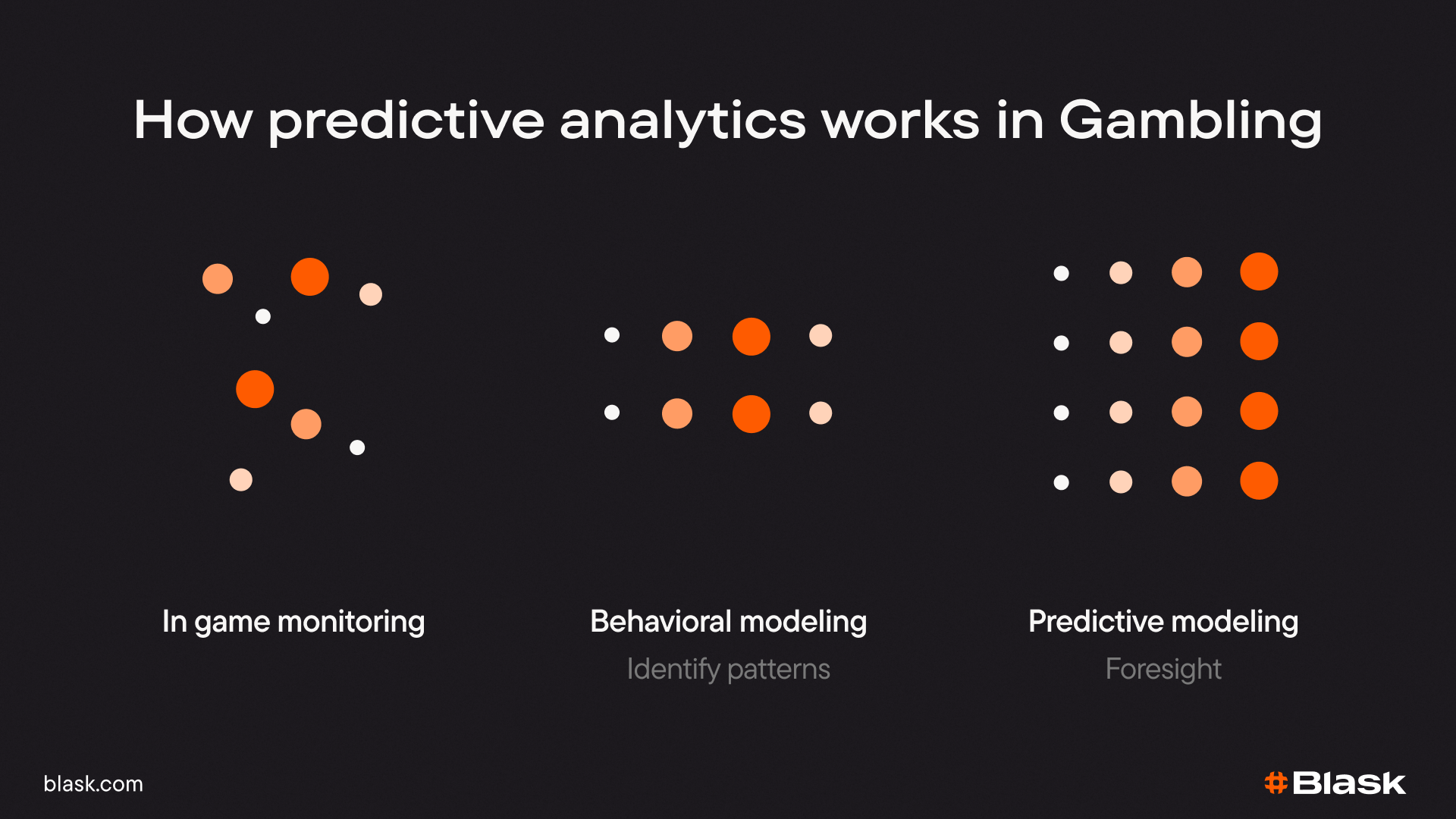
In the context of online gambling, predictive analytics can forecast player behavior, helping operators to anticipate their needs and preferences, and by continuously refining these models with new data, the predictions become more accurate over time.
-
Data collection:
Casinos gather vast amounts of data from user interactions with their games and platforms. -
Model development:
Data scientists create models that can predict behaviors based on past activities. -
Outcome prediction:
These models predict various outcomes like potential compulsive gambling behaviors or the most popular types of games. -
Implementation:
Finally, the findings are applied to enhance game features, player engagement, and security measures.
Importance in gambling industry.
Sportsbooks and service providers rely on predictive models to determine the odds of upcoming sports matches. By accurately forecasting the likelihood of various outcomes, bookmakers can set more precise odds, ensuring a balanced book and mitigating financial risks. Moreover, predictive analytics can help detect potentially fraudulent or abusive betting behaviors, allowing operators to take proactive measures to maintain the integrity of their platforms.
- Enhanced personalization:
Predictive models help tailor gaming experiences to individual preferences, which improves customer satisfaction and retention. - Risk management:
By predicting risky behaviors, platforms can proactively intervene to promote responsible gambling. - Operational efficiency:
Analytics assist in foreseeing game popularity and player engagement levels, allowing for better resource allocation and content development. - Fraud detection and prevention:
Predictive tools are critical in identifying and mitigating potential fraud, protecting both the users and the platform.
How predictive analytics enhances online gambling.
Improving customer experience.
Online casinos leverage big data and advanced analytics to gain deep insights into player preferences, gaming habits, and betting patterns. By closely monitoring the games a player gravitates towards, the frequency of their engagement, and the magnitude of their typical wagers, casinos can construct comprehensive player profiles. These profiles serve as the bedrock for delivering bespoke recommendations, empowering the casino to propose fresh games and enticing bonuses that are likely to captivate the player's attention.
Enhancing risk management and security
By closely monitoring user actions, such as login attempts, betting habits, and transaction histories, sophisticated algorithms can detect suspicious activities that may indicate account hacking attempts or payment fraud. This proactive approach allows casinos to take swift action, protecting both their players and their reputation.
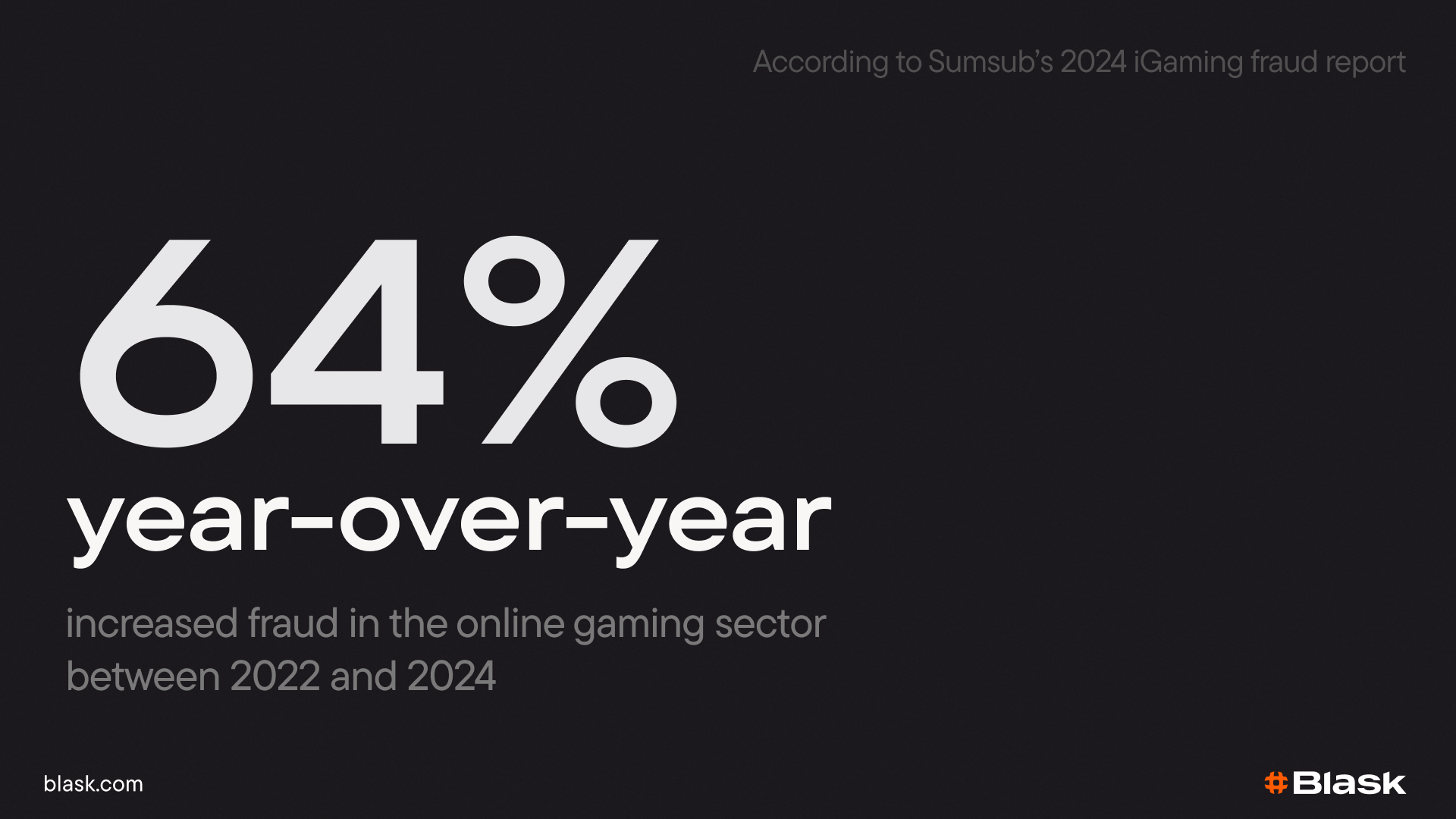
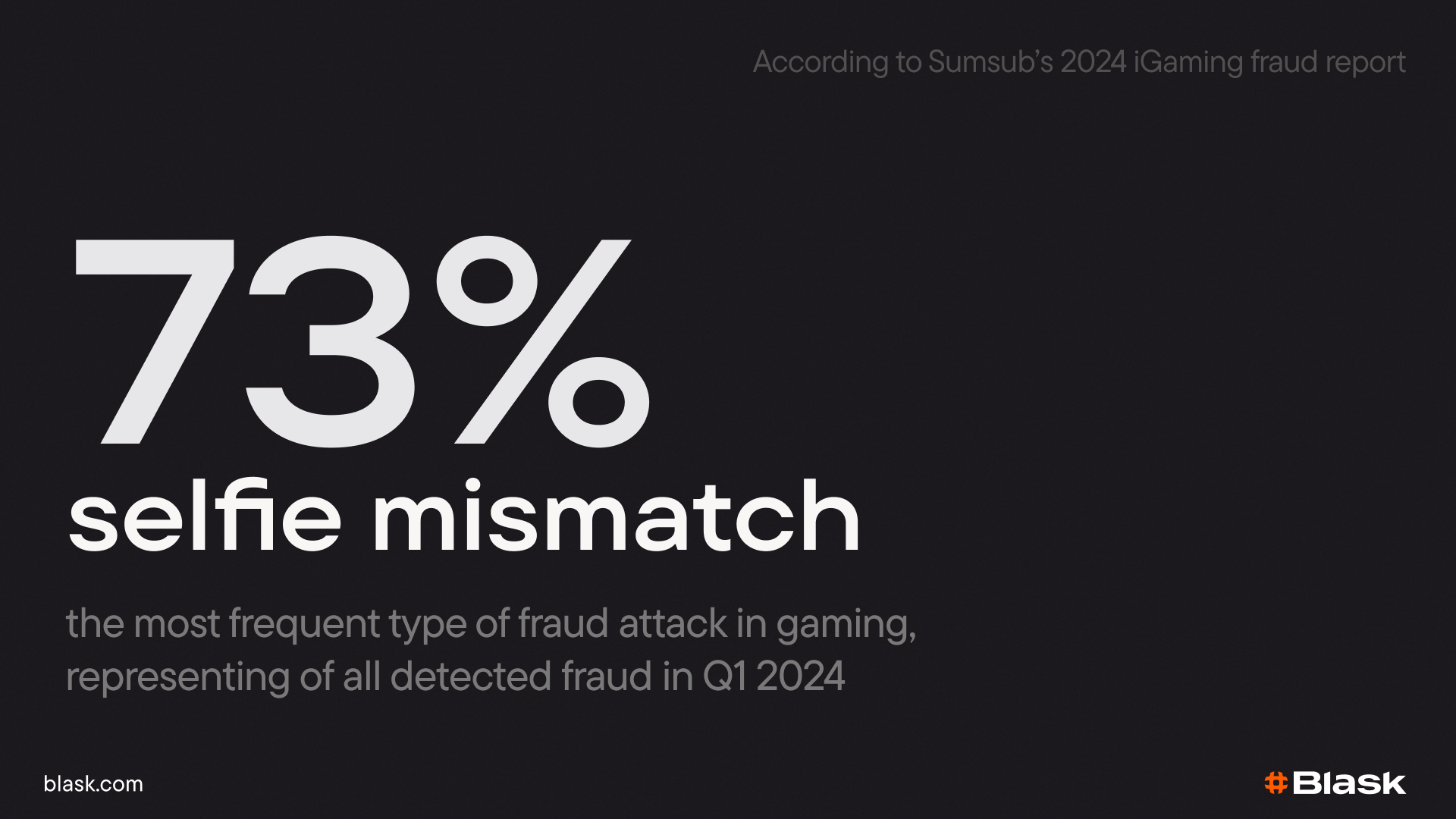
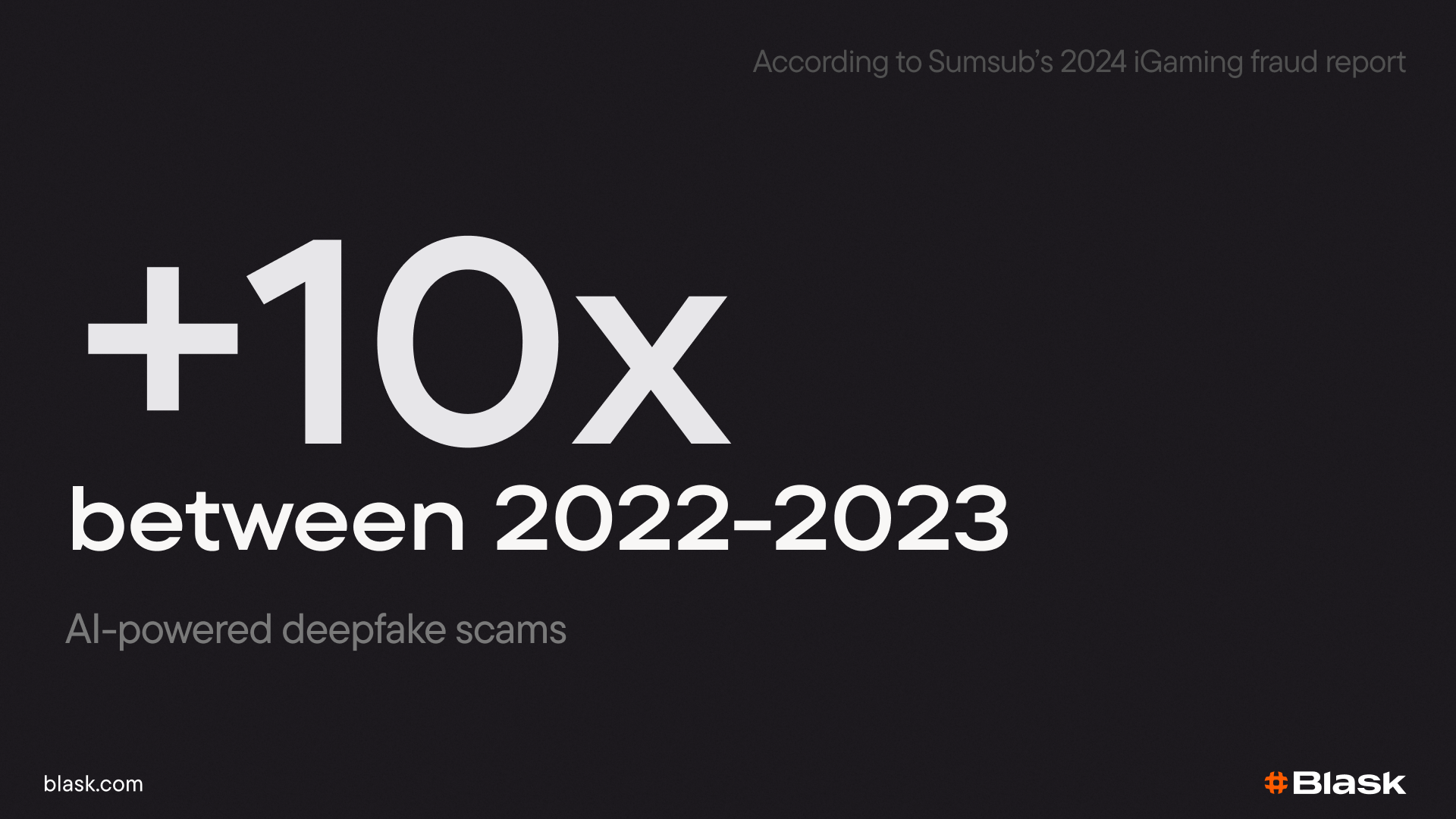

Predictive analytics enables casinos to anticipate potential issues before they escalate. By analyzing vast amounts of historical data, these advanced models can identify trends and patterns that may signal future problems, such as a player's likelihood of developing gambling addiction.
Through regular analysis of game outcomes and the performance of random number generators (RNGs), operators can ensure that their games meet the highest standards of integrity. This transparency not only fosters trust among players but also helps casinos comply with stringent regulatory requirements.
Faster decision-making with data.
AI-driven predictive analytics accelerates decision-making processes in casino operations by providing instant insights from massive datasets. AI algorithms can rapidly sift through data, identifying trends and patterns that inform strategic decisions, such as determining optimal times for game promotions or identifying underperforming games. This speed enhances operational efficiency, ensures swift responses to market dynamics, and improves customer service by addressing player needs and preferences in real-time.
Blask takes this responsiveness to the next level by reacting to market changes with an impressive granularity of just one hour.
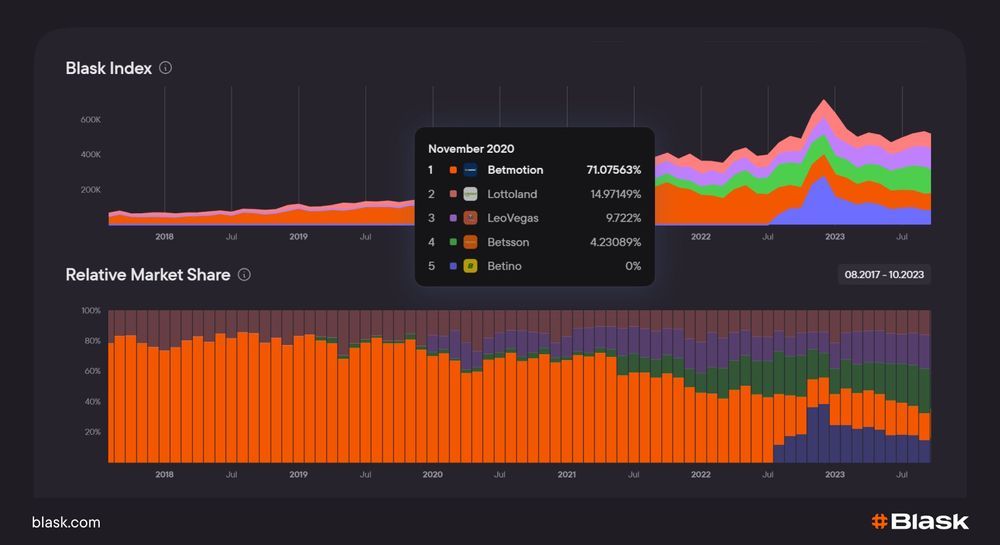
Blask's hourly data granularity allows operators to monitor key metrics such as Blask Index and Relative Market Share in near real-time. This enables them to quickly identify emerging trends, capitalize on opportunities, and address potential challenges before they escalate. By providing actionable insights at such a high frequency, Blask helps operators optimize their strategies, enhance player experiences, and ultimately drive growth in the fast-paced iGaming industry.
Personalizing marketing with AI.
By analyzing player data, AI helps casinos understand individual preferences, behaviors, and spending patterns, allowing them to craft tailored promotions and offers that resonate with each player. This level of personalization enhances the player experience, increases engagement and conversion rates, and improves the return on investment (ROI) by ensuring marketing efforts are not wasted on irrelevant promotions.
Additionally, Marketing Mix will offer valuable insights into the performance of competitor's marketing channels, helping operators make data-driven decisions according to best practices to maximize their advertising and marketing campaigns.
Optimizing strategies in gambling with AI.
Leveraging predictive analytics.
Predictive analytics enables casinos to optimize strategies and maximize profitability by forecasting future trends based on historical and real-time data. By understanding player behavior patterns, casinos can design more appealing game offerings and promotions, tailored to maximize engagement and retention. Predictive analytics also aids in dynamic pricing strategies, ensuring a balance between attracting players and maintaining profitability.
Advanced player segmentation.
Predictive analytics allows casinos to categorize players into distinct segments based on behavior, preferences, and spending patterns, enabling targeted marketing campaigns and personalized experiences. High rollers may receive exclusive VIP benefits, while casual players might get bonuses that encourage more frequent play. Segmentation also helps in identifying at-risk players, allowing for timely interventions to retain them.
This early identification provides customer relationship management (CRM) teams with a valuable window of opportunity to intervene and revitalize the player's interest through targeted, personalized engagement strategies, ultimately reducing churn rates and fostering long-term player loyalty.
All of this is very hard to segment by a human brain,” he explains. “You cannot create micro segments. That’s why you need to have certain tools and big data analytics and AI to make sure everything works in the best possible way.
Tailoring game selection.
By analyzing player preferences and behaviors, casinos can curate a game offering that resonates with their audience, enhancing engagement and satisfaction. If data indicates a high demand for specific game themes or features, casinos can prioritize those types of games. Understanding which games lead to longer playtimes or higher spending can guide operators in allocating resources to promote these games effectively.
According to GAMMASTACK, casino operators leveraging predictive AI have reported a 15-25% increase in overall revenue attributed to higher player engagement and longer play sessions.
Blask games and game providers.
Blask provides insights into game and game provider performance, helping casinos optimize their gaming strategies and stay ahead of emerging trends. By analyzing data on various games and providers, Blask helps operators understand which games are most popular among players and which providers consistently deliver high-quality content. This information is crucial for making informed decisions about which games to feature prominently and which providers to partner with for future offerings. This feature will be available till the end of 2024.

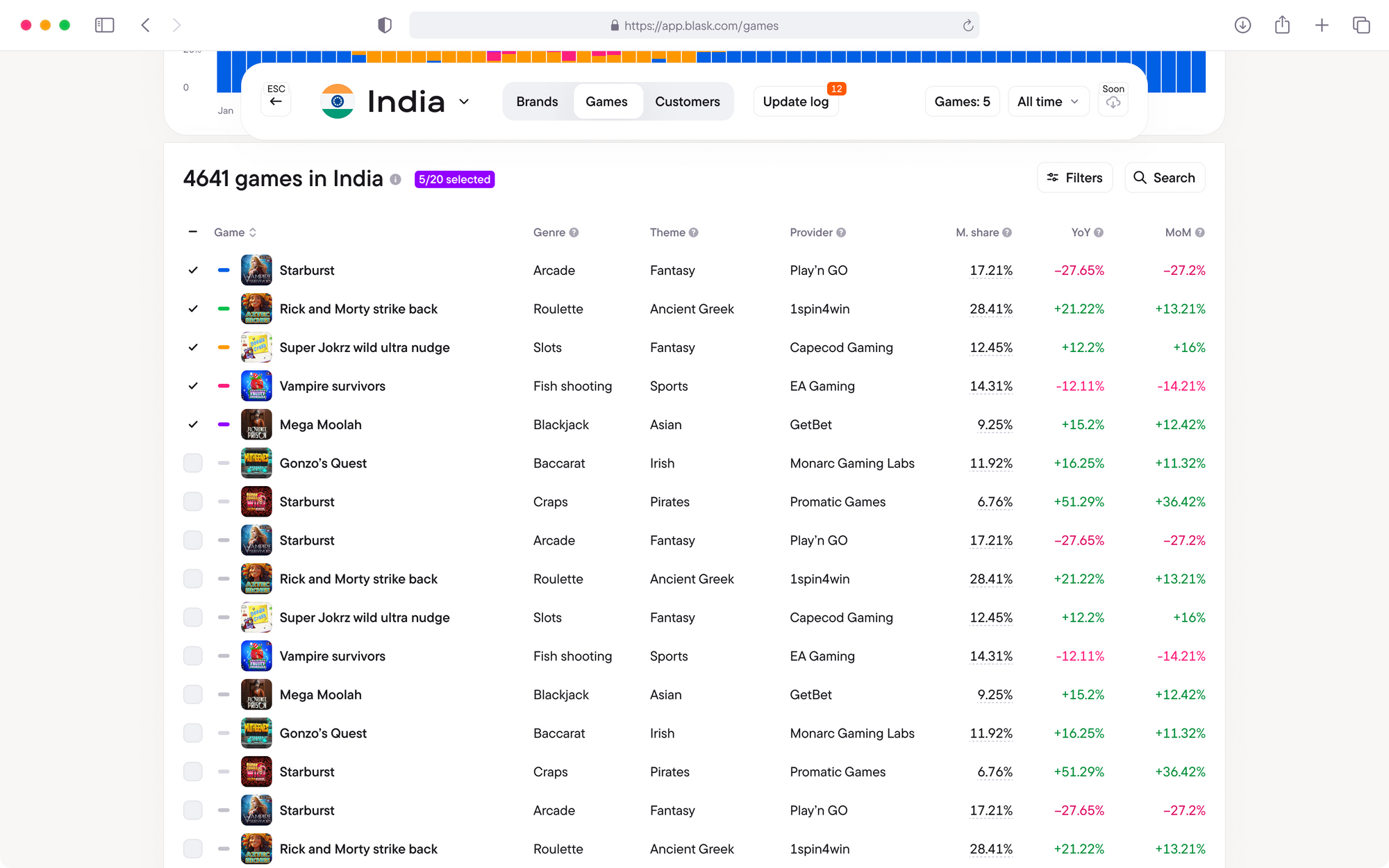
Blask Games and Game providers feature with the mock data
Ethical considerations.
Privacy concerns.
The integration of predictive analytics in online gambling necessitates the meticulous handling of personal data. Privacy concerns arise when casinos collect, analyze, and store large volumes of user data to enhance gaming experiences or identify potential fraud and gambling addiction. Ensuring user data is secure and used in compliance with privacy laws, such as the General Data Protection Regulation (GDPR) in the EU and the California Consumer Privacy Act (CCPA) in the U.S., is paramount. Casinos must carry out robust data protection measures and transparent privacy policies to maintain user trust. Transparency in how user data is utilized, the ability for users to control their own information, and rigorous security protocols to prevent unauthorized data access are essential components of ethical predictive analytics practices.
This is something that iGaming businesses need to be conscious of. It’s not so much about the collecting data, but about being able to report on it and having quick access to that data too. As such, these companies should look at building their own technology stacks. That gives them much more control over privacy and data security of it.
— Nick McDonald, global account director at Fujitsu
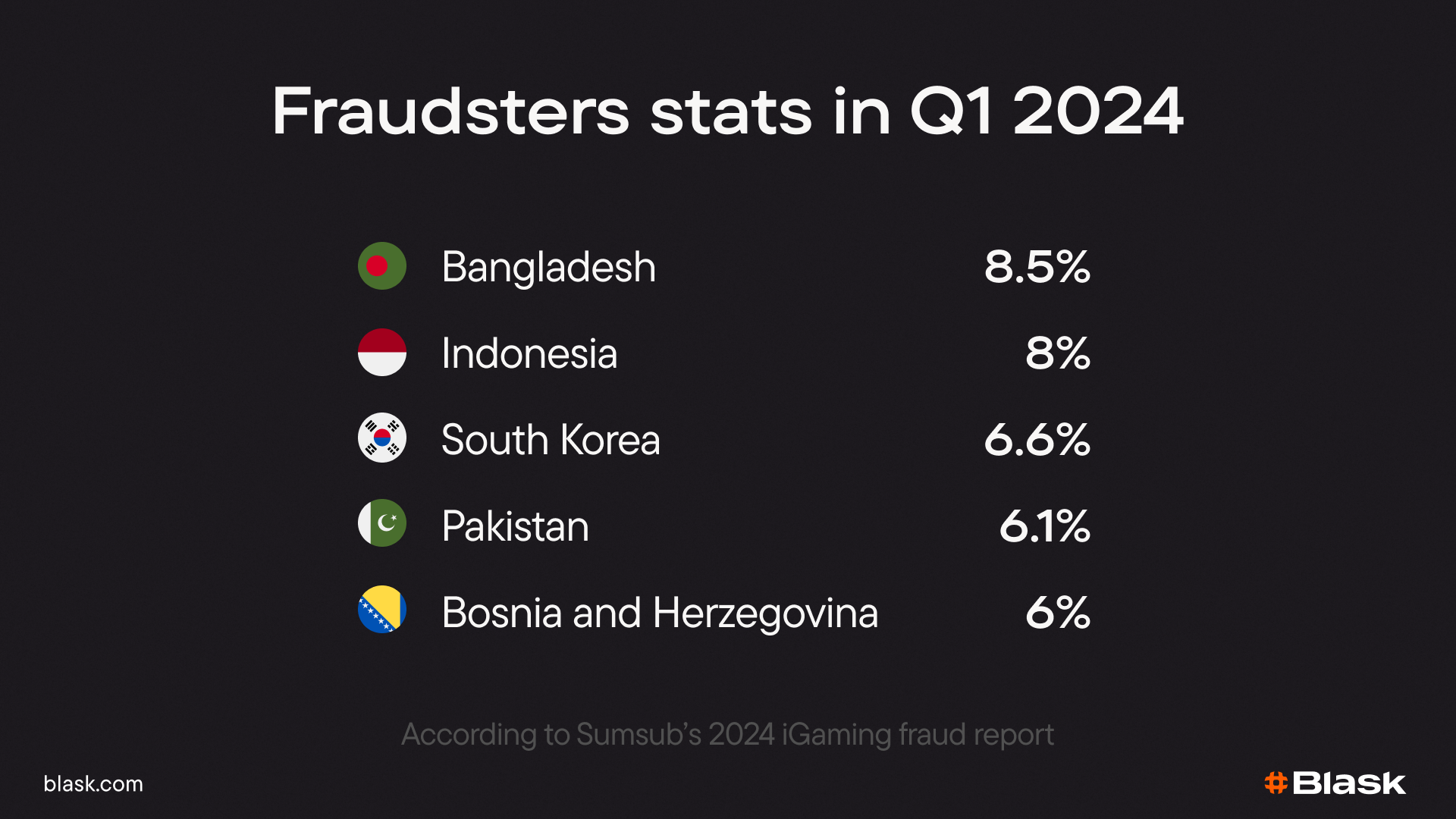
Responsible gambling.
Predictive analytics plays a pivotal role in fostering responsible gambling practices. By analyzing player behavior, online gambling platforms can identify signs of compulsive gambling and intervene early. Real-time data allows casinos to set customized limits for players at risk and offer self-exclusion options. Also, educational tools powered by AI can be provided to inform players about gambling risks. Emphasizing the implementation of features that promote self-awareness and control, such as temporary breaks, deposit limits, and loss limits, ensures that gambling remains a safe and enjoyable activity. Maintaining a balance between player engagement and responsible gaming is crucial, as it not only helps players but also builds a sustainable business model for online casinos by prioritizing customer welfare.
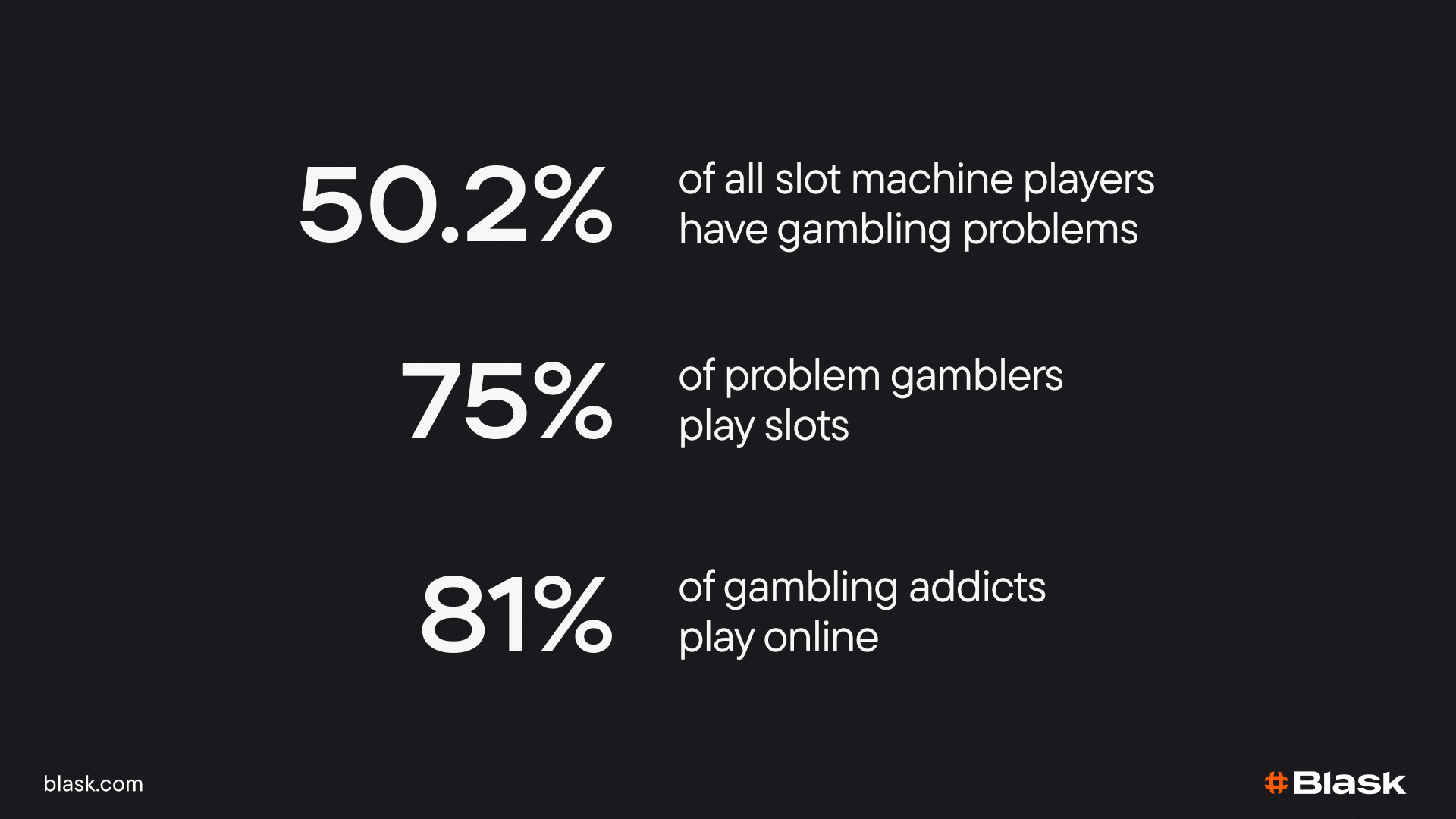
Case studies: success stories in action.
Grand Sierra Resort's AI Implementation
Grand Sierra Resort (GSR) in Reno, Nevada, showcases a successful AI implementation that revolutionized its operations. By integrating Gaming Analytics, an AI-powered predictive analytics platform, GSR significantly improved its decision-making processes and operational efficiency.
This tool enabled the resort to optimize its marketing efforts by creating personalized offers based on player preferences, leading to enhanced player engagement and satisfaction.
Additionally, AI insights helped GSR redesign its slot floor layout, aligning it with player behavior to maximize gaming enjoyment and profitability. The use of real-time data allowed the resort to quickly identify unprofitable players and adjust strategies accordingly, ensuring resources were allocated efficiently.
According to Danny Britson, VP of Casino Operations, the platform empowered GSR to "make more money with fewer resources" by providing instant insights and detailed reports. This case study highlights the transformative potential of AI in boosting casino profitability and operational effectiveness, demonstrating the strategic advantage it offers in the competitive gaming industry
LuckyStrike's data-driven revolution
LuckyStrike, a mid-sized online casino, experienced a significant transformation through the implementation of data-driven strategies. By leveraging predictive analytics, LuckyStrike was able to segment its player base more effectively, allowing for highly targeted marketing campaigns.
This personalization led to a 25% improvement in marketing ROI and a 20% increase in player retention. Additionally, the casino optimized its game offerings based on engagement data, ensuring that popular games were prominently featured, which boosted overall revenue by 15%. The introduction of personalized bonuses tailored to individual player preferences further enhanced player satisfaction and loyalty.
Moreover, LuckyStrike utilized churn prediction models to identify at-risk players, enabling timely interventions that reduced churn rates significantly. Advanced fraud detection mechanisms also enhanced the platform’s security, decreasing bonus abuse by 40%. LuckyStrike's data-driven approach exemplifies how predictive analytics can revolutionize casino operations, driving profitability and long-term success in the competitive iGaming industry.
Ethical considerations.
In the realm of online gambling, ethical considerations surrounding predictive analytics are critical. We explore key areas such as privacy concerns and promoting responsible gambling to ensure ethical usage of data-driven technologies.
Privacy concerns.
The integration of predictive analytics in online gambling necessitates the meticulous handling of personal data. Privacy concerns arise when casinos collect, analyze, and store large volumes of user data to enhance gaming experiences or identify potential fraud and gambling addiction.
Ensuring user data is secure and used in compliance with privacy laws, such as the General Data Protection Regulation (GDPR) in the EU and the California Consumer Privacy Act (CCPA) in the U.S., is paramount. Casinos must carry out robust data protection measures and transparent privacy policies to maintain user trust.
Transparency in how user data is utilized, the ability for users to control their own information, and rigorous security protocols to prevent unauthorized data access are essential components of ethical predictive analytics practices.
Responsible gambling.
Predictive analytics plays a pivotal role in fostering responsible gambling practices. By analyzing player behavior, online gambling platforms can identify signs of compulsive gambling and intervene early. Real-time data allows casinos to set customized limits for players at risk and offer self-exclusion options.
Also, educational tools powered by AI can be provided to inform players about gambling risks. Emphasizing the implementation of features that promote self-awareness and control, such as temporary breaks, deposit limits, and loss limits, ensures that gambling remains a safe and enjoyable activity.
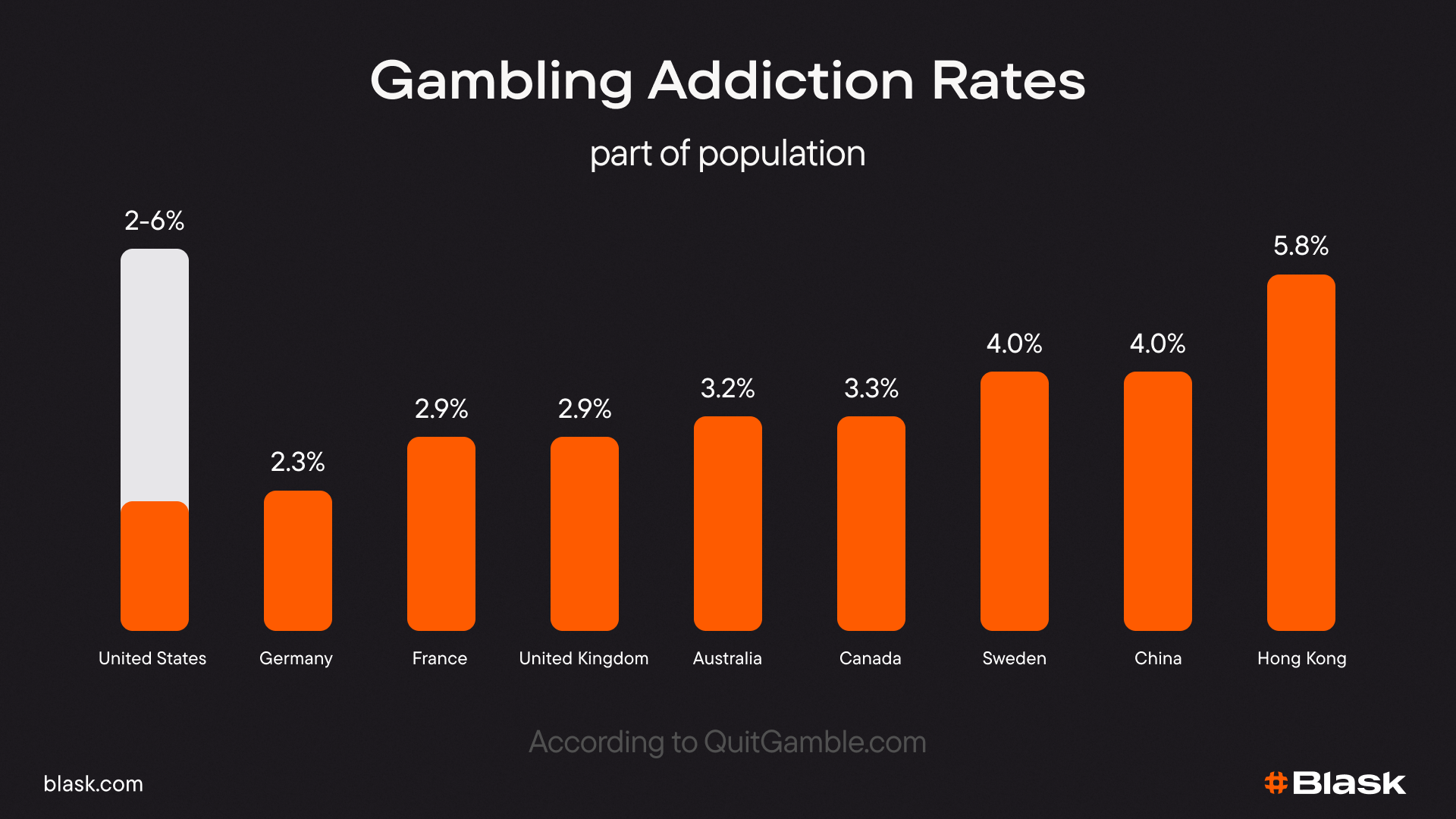
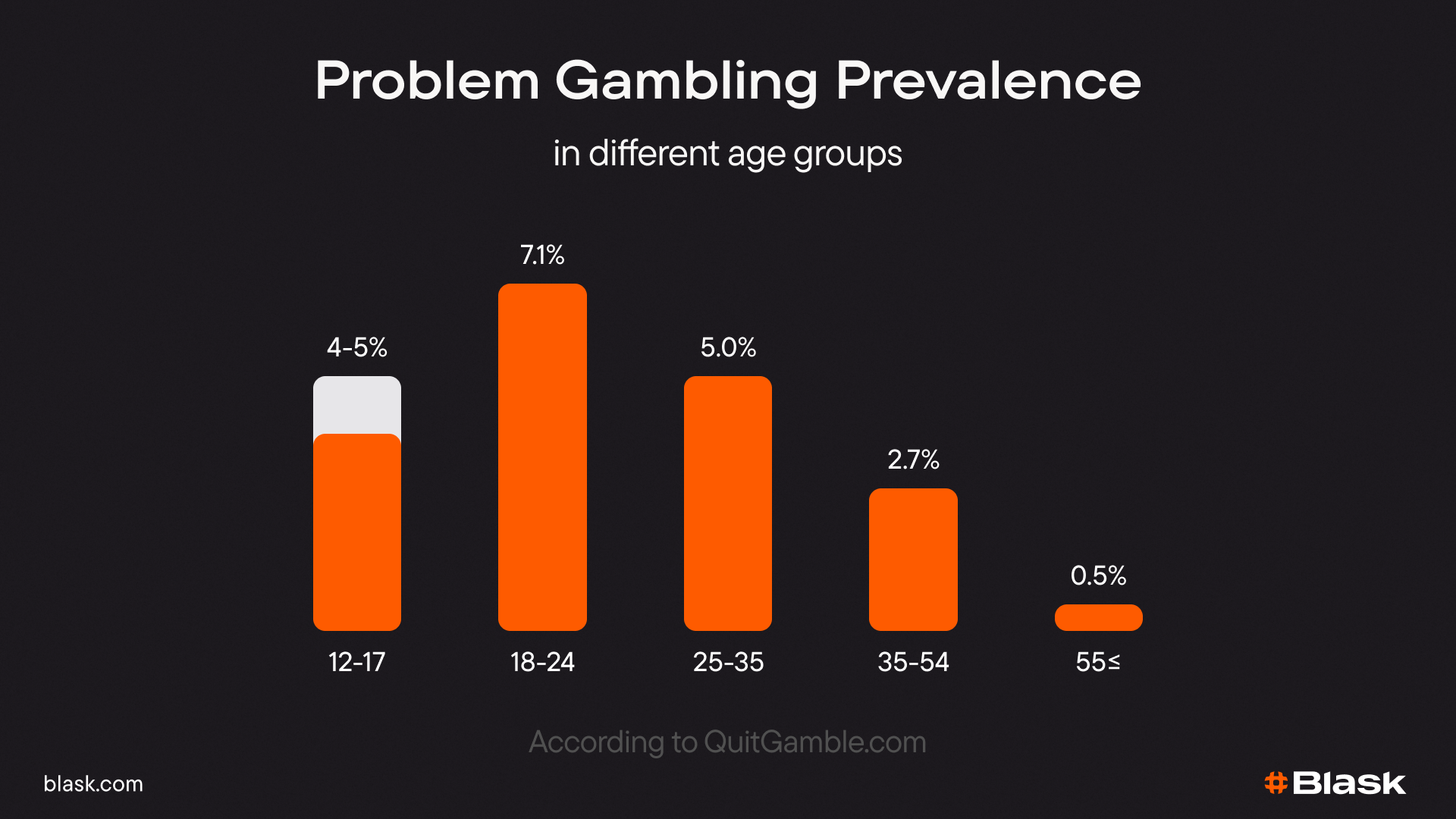
Maintaining a balance between player engagement and responsible gaming is crucial, as it not only helps players but also builds a sustainable business model for online casinos by prioritizing customer welfare.
Future innovations in online gambling.
Anticipating metric growth.
Predictive analytics enables operators to forecast key metrics such as player acquisition, engagement, and revenue trends, allowing them to tailor their strategies proactively. By continuously refining predictive models with fresh data, casinos can enhance accuracy in their forecasts, effectively navigating the complexities of the gambling industry.
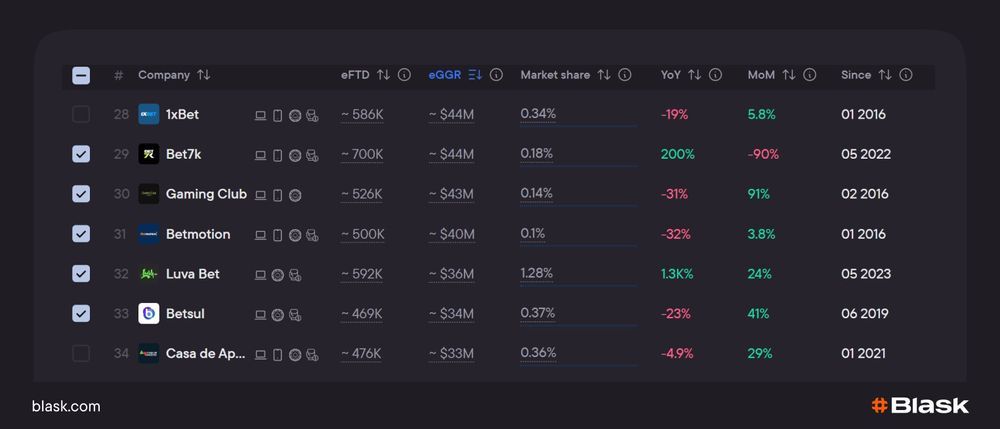
Blask empowers operators to calculate essential metrics like eGGR (Estimated Gross Gaming Revenue) and eFTD (Estimated First Time Depositors) to compare their performance against the benchmarks provided by Blask's AI model. This comparison helps operators understand their relative performance and identify areas for improvement. Moreover, Blask allows operators to compare their metrics with competitors, providing valuable insights into market positioning and competitive advantages.
Industry event impact analysis.
Major events, such as sports tournaments or gaming expos, significantly influence player behavior and engagement.
Blask plans to introduce an Events Calendar feature, allowing iGaming companies to anticipate metric growth based on significant industry events. By leveraging predictive analytics and the Events Calendar, operators can assess how events affect key metrics like player acquisition, betting volume, and revenue, enabling them to tailor promotions, manage resources efficiently, and refine marketing strategies.
This proactive approach ensures that operators can capitalize on peak periods, maximize returns, and provide a superior player experience during high-impact events, ultimately driving profitability and competitiveness in the dynamic iGaming market.
Conclusion.
Predictive analytics has indeed revolutionized the online gambling landscape. By tailoring experiences and improving safety measures it's not only enhancing the way operators interact with users but also setting new standards for ethical gambling practices. We've seen how crucial it is to strike a balance between innovative engagement strategies and the imperative of responsible gaming. As technology advances so too must our commitment to safeguarding player data and promoting transparency. Eventually embracing these practices will not only protect players but also enrich the overall gambling experience ensuring the industry's growth is both ethical and sustainable.
Unlock your iGaming potential with Blask!
Blask empowers you to make data-driven decisions, optimize marketing strategies, and drive significant GGR increases by providing unparalleled clarity about the iGaming market and your performance.
Curious about our precision? Discover our article "What is Blask?" and how Blask's cutting-edge technology is transforming iGaming analytics.
Ready to experience Blask in action?
Request a personalized demo with full access to data tailored to your niche and objectives. Fill out the form at blask.com to help us prepare use cases specific to your needs.
Need assistance?
Our support team is always here to help. Click the chat icon in the bottom right corner of your screen to connect with us instantly and get the answers you need.
FAQ
How is predictive analytics enhancing user experiences in online gambling?
Predictive analytics improves user experiences by personalizing game recommendations and interfaces based on individual behaviors and preferences, making online gambling more engaging and enjoyable for users.
What role does predictive analytics play in risk management for online gambling?
Predictive analytics helps in identifying potential fraud and assessing risks by analyzing user data and patterns. This process enhances security measures and ensures safer gambling environments by mitigating potential threats.
How can predictive analytics detect gambling addiction?
By monitoring gambling behavior and frequency, predictive analytics can identify compulsive gambling patterns. This allows for timely interventions, such as setting customized limits or providing targeted support to those at risk.
What are the ethical concerns with using predictive analytics in online gambling?
The main ethical concerns include the invasion of privacy and potential misuse of personal data. It's crucial for online gambling platforms to adhere to strict data protection regulations, like GDPR and CCPA, to maintain trust and safeguard user information.
How does predictive analytics promote responsible gambling?
Predictive analytics aids in promoting responsible gambling by enabling the creation of personalized interventions and educational resources for at-risk players, thereby helping prevent gambling-related harm and ensuring a safer gambling environment.
What importance do regulations like GDPR and CCPA hold in the use of predictive analytics in online gambling?
Regulations like GDPR and CCPA are critical as they ensure that the personal data used in predictive analytics is handled securely and transparently. Compliance with these laws protects user privacy and enhances trust in the use of predictive analytics by online gambling companies.
